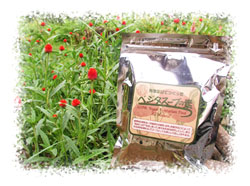








 |
 |
 |
![Vegetarian Recipes [Japanese]](../images/contents01_a.gif) |
 |
![Vegetarian Recipes [Chinese]](../images/contents01_b.gif) |
 |
![Vegetarian Recipes [European ,etc]](../images/contents01_c.gif) |
 |
![Vegetarian Recipes [Sweets]](../images/contents01_d.gif) |
 |
 |
 |
 |
 |
 |
 |
 |
 |
 |
 |
 |
 |
 |
 |
 |
 |
 |
 |
 |
 |
 |

![Vegetus Shop [Japanese]](../images/vegetesu_shop.jpg) |
 |
![Wakyo Co.,Ltd. [Japanese]](../images/wakyo.jpg) |
 |
![Vegetarian Therapy [Japanese]](../images/vegeterian_therapy.jpg) |




| Home Page > Vegetarian food flavouring > Soup stock |
 |
|||||||||||||
 |
|
 |
|||||||||||
Because of the westernization of eating habits in Japan in recent years the good old customs of the culture of making soup stocks is disappearing. What is taking its place is the uniformization of taste by chemical flavourings and seasonings. This uniformity of taste has caused a fundamental disruption in the sense of taste of the Japanese people.
Up to 6g per day for a person weighing 50 kg A report from a researcher at Washington University (USA) shocked the world by reporting that when a newborn rat was injected with sodium glutamate at any dose over 3mg/kg body weight, damage was caused to the central nervous system, fat metamorphosis occurred in the liver, and underdevelopment of the ovaries and uterus was seen. The harmful properties of "... no Moto" have been investigated both in Japan and around the world, and the UN agencies FAO (Food and Agriculture Organization) and WHO (World Health Organization) have stipulated a safety standard of "120mg per day per 1kg body weight" (6g per day for a person who weighs 50kg) for sodium glutamate. Research carried out by the former Japanese Ministry of Health and a manufacturers" organization suggested the rough guideline that "less than 3g at one time is safe," but American research has found cases where problems arise after ingestion of only 1.5g and so there is some doubt about the safety of the Japanese guideline. Especially foetuses and newborn babies, whose blood-brain barrier is not yet fully developed, and who therefore have reduced defences against the intrusion of harmful substances into the brain cells, may be directly affected by the neuronal excitotoxic nature of chemical flavourings. The destruction of nerve cell neurons by the administration of sodium glutamate has been confirmed. "Hondashi", "real" soup stock concentrate = fake soup stock Since the harm caused by synthetic chemical flavourings has become generally well known, as you would expect, the number of people using "... no Moto" for cooking has declined. So recently we hear people saying things like, "... no Moto isn"t good for you so we're using hondashi." I'm sorry to have to tell you this, but... The following pie charts show the contents of stock powder or granules and the liquid stock produced from the powder or granules, as analysed by the Tokyo Metropolitan Government's Comprehensive Consumer Life Center.
Over 80% of the content of the powder or granule stock is "... no Moto", salt and sugar. That is the state of currently marketed stocks. In addition to "hondashi" there are also all kinds of stocks, sauces and dressings for soups meat dishes and salads and so on, which do not use natural flavourings as the makers claim, but are inferior products made by the addition of food additives and synthetic chemicals.
These are delicious and good for you!! Three important ingredients!! The traditional konbu (kelp seaweed) and shiitake mushroom, and the new tea tree mushroom (chashu kinoko)
The soup stock concentrate that contains all three of these important ingredients is here!! Good for you and delicious! Teabag type 100% vegetarian stock Vegetus soup stock concentrate
|
|||||||||||||
 |
 |
 |
|||||||||||









